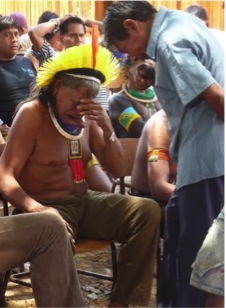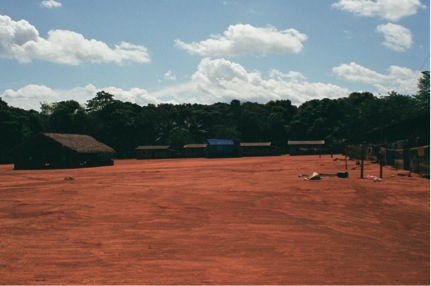Appreciation to Advocacy: Samba Batucada to the Kayapó Community
Antonio Peluso, Anthropology Major
I write this as a fourth-year transfer student of anthropology at UC Santa Cruz, and this is my story:
My first exposure to Brazilian culture was in a world percussion ensemble during high school where I learned to play the different instruments of the samba batucada— a samba street band drum ensemble. The rhythms and energy of samba drumming were so infectious that I yearned to visit the country from which they came—Brazil. As high school came to an end and the pressure to pursue higher education mounted, I applied to a program called Global Citizen Year that granted me a fellowship to spend ten months in Bahia, Brazil. In Salvador, Bahia’s capital and an epicenter of Afro-Brazilian culture, I apprenticed with a Black power activist and volunteered at a community center for at-risk youth. During the week, I played drums made out of recycled oil drums, plastic jugs, and glass bottles with children at the community center, and on the weekend, I gave presentations with an activist working to break down racist stereotypes in traditional Brazilian nursery rhymes.
On one of my days off from volunteering, I visited a private Brazilian high school where, to my surprise, all of the students and staff were white. Salvador has the highest Afro-Brazilian population in Brazil, part of its legacy as a center of the colonial slave trade. The school reflects the strikingly apparent disparities in ways of living and experiences of inequality in Brazil. I was constantly reminded that the Afro-Brazilian children I worked with and their families were stuck in a cycle of poverty driven by a racial hierarchy that privileged people with white skin. My own white privilege, which allowed me to go to Brazil and constantly accompanies me, is something that I not only acutely recognize, but am committed to leveraging to stand in solidarity with peoples marginalized by a racist and unequal society.

Vanderbroek, Angela. Chief Raoni Metuktire of Brazil’s Kayapó. 2013
A few months into my year in Brazil, a friend showed me a photograph on her Facebook newsfeed of Kayapó Chief Raoni sobbing with his head in his hand. The caption read something like, Kayapó Chief devastated after the Brazilian government approves the Belo Monte Dam. After some research into this mega-hydroelectric project, I asked myself how something that would displace indigenous people, destroy the land and river they depend on for survival, and that is so apparently unjust could be happening. Again, I was stricken by the inequalities of society that were, in this case, about to flood indigenous homes and livelihoods to provide hydroelectric energy to urban Brazil and aluminum mining.
I began an internship during the summer of 2014 at the Amazon Conservation Team (ACT)—a conservation NGO based in Arlington, Virginia that partners with indigenous communities in the Amazon to protect the rainforest. I was exposed to the staggering number of threats and struggles that indigenous peoples faced and pledged myself to support their struggle. Immediately after my internship at ACT, I attended an ethnographic field school that took place in a Kayapó village where I witnessed many Kayapó struggles first-hand. I heard villagers’ fears about the destruction of their forests by agriculturalists trying to expand their cattle ranches and the fear of water pollution of their river due to illegal mining within their demarcated territory. These experiences further inspired my commitment to stand in solidarity with Native Amazonians; this is what brought me to UC Santa Cruz as an anthropology student.

My time as an undergraduate anthropology student at UC Santa Cruz has been instrumental in my pursuits to advocate for indigenous peoples. In retrospect, I have gained so much from the UCSC Anthropology Department, even though the past two years since transferring from the Santa Rosa Junior College seem to have flown by. I have many people to thank at Santa Cruz who have helped me reach my goals of completing a research project with the Kayapó. I returned to the Kayapó community in Brazil with National Science Foundation funding made possible by my advisor Flora Lu. With the support of Andrew Mathews, and all of the opportunities, time, and effort I have been afforded at UC Santa Cruz, I wrote a research paper, How Will the Kayapó be Dammed: The Impacts of Environmentalist Assumptions on a Kayapó Community in the Brazilian Amazon. Writing this paper hasn’t helped the Kayapó community I worked in any direct way so far, but it has helped me to better understand how I can serve their community. I look forward to continuing to work with indigenous people in Brazil in graduate school, doing collaborative work with communities where I serve as an ally and instrument to help indigenous communities meet their own goals. Thank you to the Anthropology Department at UC Santa Cruz for affording me these opportunities.
